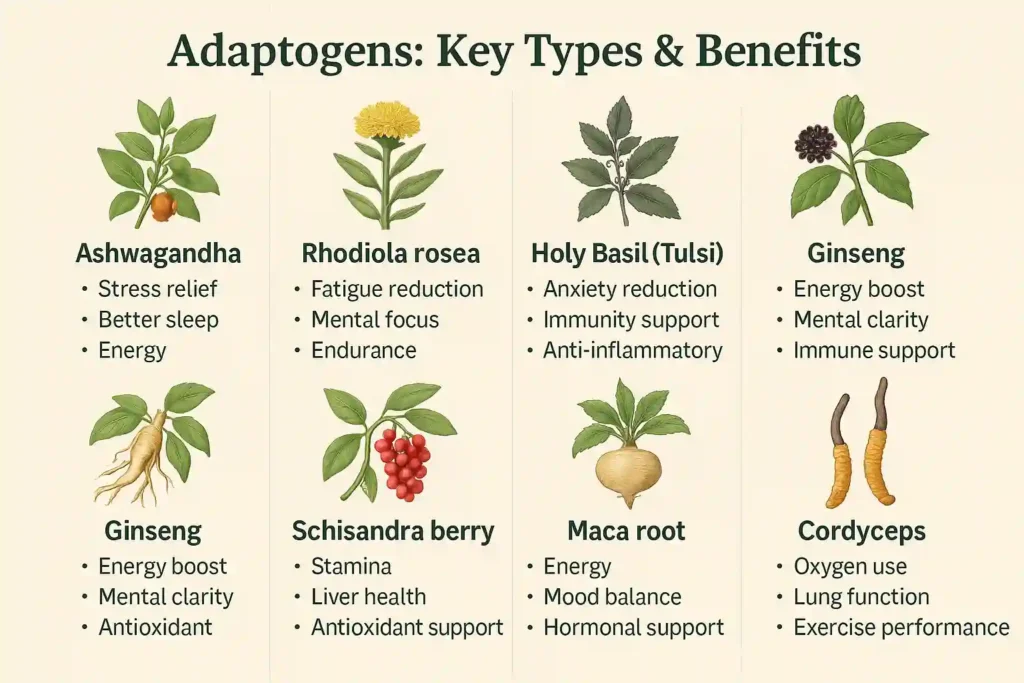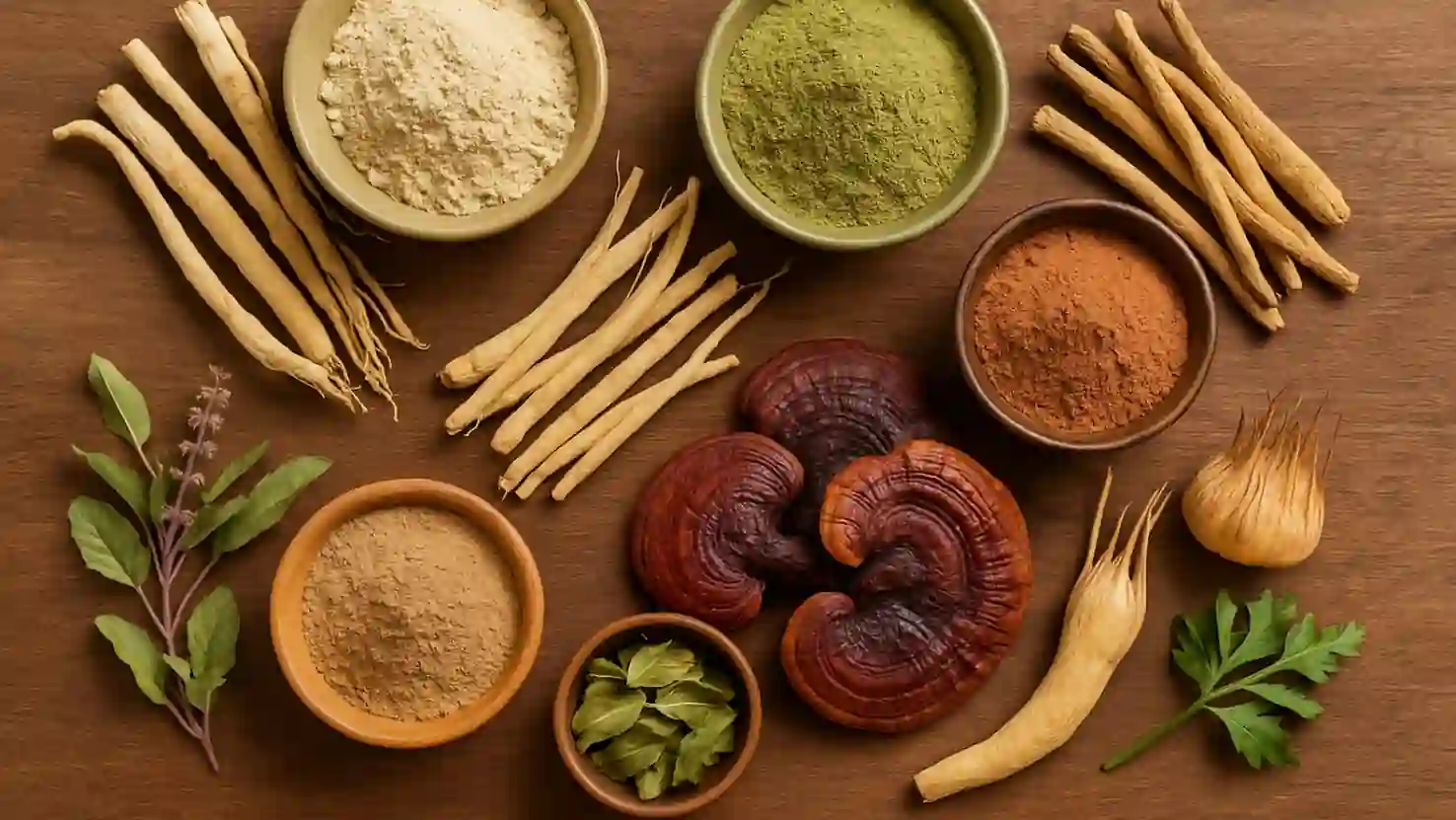Overview
What are adaptogens?
Adaptogens are certain plants, roots, and mushrooms that help your body handle stress. Unlike regular supplements, they don’t just give you energy or make you sleepy, they aim to balance your system.
This balance means they help your body adjust, whether you’re feeling worn out or overstimulated. You might also have heard about adaptogenic herbs. These plants contain active compounds that enhance your body’s capacity to cope with mental, physical, or emotional stress.
Traditional systems like Ayurveda and Chinese medicine have used adaptogens for thousands of years. Today, modern research is exploring how they may support mood, immunity, and overall well-being.
What do adaptogens do to my body?
Adaptogens work by supporting your body’s stress response system, also known as the hypothalamic-pituitary-adrenal (HPA) axis. When you’re stressed, your body releases hormones like cortisol. Too much cortisol for too long can lead to fatigue, low immunity, and poor focus. Adaptogens help keep cortisol and other stress hormones in a healthy range.
This means when you’re tired, they can gently boost your energy. When you’re wired, they can help you calm down. Over time, they may improve endurance, mood, and mental clarity.
Are adaptogens regulated by the U.S. Food and Drug Administration?
Adaptogens according to the FDA, In the United States, the Food and Drug Administration does not approve adaptogens as medicines. They are available in the form of dietary supplements or food products. This means companies don’t have to prove their effectiveness in the same way as prescription drugs.
Because of this, quality can vary between brands. It’s important to choose products from trusted sources and speak with a healthcare provider before starting them.
What types of adaptogens exist?

The examples of adaptogens are many, each with unique benefits supported by traditional use and, in some cases, scientific research. These adaptogens are drawn from different parts of the world and have been valued for centuries. Here are the most well-known:
Ashwagandha
Ashwagandha root is one of the most researched adaptogens. Traditionally used in Ayurveda, it is often taken to reduce stress, improve sleep quality, and support energy levels without overstimulation. Studies suggest it may help lower cortisol, the main stress hormone, and support thyroid function. Many also use it for muscle recovery and mental focus.
Rhodiola rosea
Native to cold regions like Siberia and the Arctic, this root has been used for centuries to improve stamina and resilience. It may help reduce fatigue, sharpen mental focus, and improve exercise performance. Some research suggests it can help the brain recover from mental stress, making it useful for students, athletes, and people with demanding jobs.
Holy basil (Tulsi)
Often called the “Queen of Herbs” in India, holy basil is used in teas and traditional remedies. It may help reduce anxiety, protect the immune system, and act as a natural anti-inflammatory. Tulsi tea is a popular way to enjoy its calming effects and gentle aroma.
Ginseng
Both Asian ginseng (Panax ginseng) and American ginseng are considered powerful adaptogens. They are often used to increase energy, improve mental clarity, and boost the immune system. Some studies show potential benefits for lowering blood sugar and supporting heart health.
Schisandra berry
This bright red berry from traditional Chinese medicine is said to improve physical performance, support liver health, and protect against fatigue. It’s rich in antioxidants and contains compounds that may help the body respond better to stress.
Maca root
Native to the Andes mountains, maca is often used for energy, mood balance, and hormone support. Some research links maca to improved endurance, sexual health, and stress tolerance. Its nutty, earthy flavor makes it easy to add to smoothies or oatmeal.
Eleuthero
Also known as Siberian ginseng, eleuthero is not related to true ginseng but is valued for its ability to improve endurance, reduce fatigue, and support the immune system. It’s often used by people who want steady energy without caffeine.
Cordyceps
This fungus has been used in traditional Chinese medicine for centuries. Cordyceps may improve oxygen use in the body, support lung function, and increase energy during exercise. It’s popular among athletes and older adults for its potential stamina benefits.
These are all herbal adaptogens and adaptogenic plants recognized around the world. The best adaptogen for you depends on your health needs, lifestyle, and personal preferences.
How do I take adaptogens?
Adaptogenic herbs when it comes to daily use, are available in capsules, tablets, powders, tinctures (liquid extracts), and teas. The form you choose often depends on your routine and taste preference. Powders can be added to smoothies, coffee, or oatmeal. Capsules provide a convenient option for those who may not enjoy the flavor. Tinctures are concentrated extracts that can be combined with water or juice.
When choosing a product, look for high-quality, tested supplements without unnecessary fillers. Always follow the dosage on the label, as each adaptogen has its own recommended range.
Can I drink adaptogens in tea?

Adaptogenic foods and drinks are perfect for brewing into tea. For example:
- Holy basil (Tulsi) tea is known for its calming properties.
- Ashwagandha tea may promote restful sleep.
- Ginseng tea is frequently consumed for a mild energy enhancement.
Brewing adaptogens in tea allows for slow, relaxing consumption while releasing beneficial plant compounds into the water. Some people mix adaptogen teas with other herbs like chamomile or mint for flavor and added benefits.
Why should I take adaptogens?
The best adaptogens may help with mental clarity, steady energy, and emotional balance. They might also help you recover faster after exercise and support immune function. While they aren’t a cure for stress, they can be a gentle aid for people feeling mentally or physically drained.
The Bottom Line
Adaptogens are natural herbs and plants that assist your body in adapting to stress and regaining equilibrium. While not a cure-all, quality adaptogenic herbs like Ashwagandha, Rhodiola rosea, and Holy basil (Tulsi) can support energy, mood, and resilience when used consistently. Always choose trusted sources and consult a healthcare provider before starting.
FAQs
What dosage strengths and forms do adaptogens come in?
Adaptogens are available in capsules, powders, teas, and tinctures. Common doses range from 300 mg to 1000 mg daily, depending on the herb. Always follow the product label and consult your doctor.
How long should I take adaptogens?
Most adaptogens are taken for several weeks before effects are noticed. Many experts suggest using them for six to eight weeks, then taking a short break before restarting, to maintain effectiveness.
What are the side effects of adaptogens?
While generally safe for most people, adaptogens may cause side effects like stomach upset, headaches, or mild insomnia. Reactions depend on the herb and the individual. Always start with a small dose.
Adaptogens could react with medicines
Yes, adaptogens can interact with certain medications, including those for blood pressure, thyroid, or blood sugar. These interactions can change the drug’s effect, so medical guidance is essential before starting.
What should I tell my healthcare provider before starting adaptogens?
Share your full medical history, including current medications, allergies, and any chronic health issues. This helps your provider decide if adaptogens are safe and which type may be most suitable for you.
What do adaptogens do to you?
They help regulate your stress response, support energy levels, and promote emotional balance. Adaptogens work gradually, so their effects may be subtle at first but build up over regular use.
What is the dark side of adaptogens?
The dark side is that not all products are pure or tested. Some may contain fillers or be contaminated. Misuse or high doses may lead to side effects or hormonal changes over time.
What is the most powerful adaptogen?
There is no single “most powerful” adaptogen. Each has its own strengths. Ashwagandha is popular for calming effects, while Rhodiola may excel in boosting stamina and focus under mental stress.
















Leave a Comment